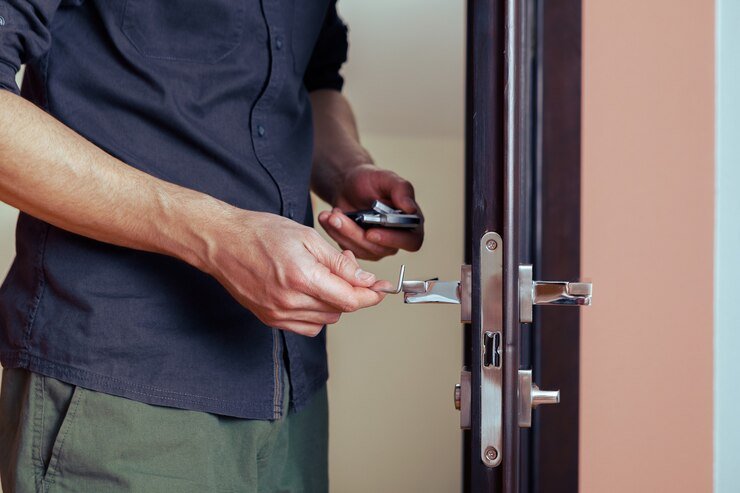If you’ve ever been locked out of your home or car, or needed to upgrade your security, then you’ve probably had to call a locksmith. In Nigeria, locksmiths are more than just people who fix locks—they’re an essential part of the security system in homes, businesses, and even cars.
Whether you’re curious about becoming one or just want to understand the trade, this guide breaks it all down in simple terms.
What Does a Locksmith Really Do in Nigeria?
At its core, locksmithing is all about security. A locksmith helps people access and secure their property. From homes to offices, shops, and cars, locksmiths are behind the scenes making sure doors open when they should—and stay locked when they shouldn’t.
The job isn’t just about cutting keys or picking locks. Today’s locksmiths handle a wide range of tasks, including:
- Installing and repairing locks
- Duplicating keys
- Working with safes (installing and opening them)
- Installing electronic and smart locks
- Assisting during emergencies like home or car lockouts
You’ll also find mobile locksmiths—those who respond quickly to urgent calls. These are the folks who save the day when someone is stuck outside in the rain with a broken key.
Why More Nigerians Are Turning to Locksmithing
As cities like Lagos, Abuja, and Port Harcourt expand, and more people invest in homes and businesses, the need for locksmiths continues to grow. Real estate developers, security companies, and even car owners regularly need their services.
The rise of digital and biometric locks also means there’s a growing demand for locksmiths who understand new technology.
In short, it’s a profession with solid income potential, flexibility, and room to grow—especially if you eventually want to run your own business.
What It Takes to Be a Good Locksmith
Being good with tools is just one part of the job. Successful locksmiths also need:
- Reliability – Clients trust you with their security.
- Problem-solving skills – No two lock issues are the same.
- Patience and attention to detail – Mistakes can be costly.
- Professionalism – First impressions matter.
- Willingness to learn – Security technology evolves quickly.
There are well-known locksmiths in Nigeria, like Emeka Chukwu and Bayo Abiola, who’ve built strong reputations by following these principles.
What Education and Skills Do You Need?
1. Basic Education
You don’t need a university degree to become a locksmith. Most start with a secondary school certificate (WAEC or NECO). A background in subjects like math, physics, or technical drawing can be helpful.
2. Vocational Training and Apprenticeship
To learn the craft, many people:
- Attend technical or vocational schools like the Nigerian Institute of Locksmith Training
- Learn key cutting, installation, and digital lock systems
- Go through apprenticeships with experienced locksmiths
You’ll find skilled mentors at places like Fortress Security Nigeria, and in workshops across big cities and towns.
3. Advanced Certification
Once you’ve got the basics, getting certified through organizations like the Nigerian Security and Locksmith Academy can open more doors.
You could even specialize in:
- Automotive locksmithing
- Electronic lock systems
- Safe and vault security
Legal Requirements and Ethical Standards
Being a locksmith means handling sensitive matters—people’s homes, businesses, and valuables. To operate legally and ethically:
- Register with the Nigerian Locksmith Association
- Maintain confidentiality with client details
- Comply with local laws and background checks
Clients will trust you more when you’re properly certified and legally recognized.
The Power of Apprenticeship in Nigeria
In Nigeria, learning on the job is one of the best ways to master a trade. In locksmithing, apprenticeships:
- Provide access to tools and real challenges
- Teach customer service from experts
- Build connections with clients and suppliers
Make sure your mentor has a workshop and ideally offers a certificate after training.
Career Options and Income Potential
Where Can Locksmiths Work?
- Independently as mobile locksmiths
- With security firms like Delta Lock Services or Lagos Secure Systems
- In the real estate sector
- In automotive workshops
- In emergency response units
How Much Can You Earn?
- Beginners: Around ₦40,000/month
- With security firms: ₦100,000 to ₦150,000/month
- Experienced independents: Over ₦180,000/month
Those with skills in electronic or biometric systems are in especially high demand.
Starting Your Own Locksmith Business in Nigeria
1. Learn the Craft Properly
Attend proper training and practice regularly.
2. Get Certified and Registered
- Apply for a locksmith license through the Nigerian Security and Civil Defence Corps
- Register your business with the Corporate Affairs Commission (CAC)
- Complete background checks
3. Buy the Right Tools
Invest in:
- Lock pick sets
- Key cutting machines
- Digital lock testers
4. Create a Business Plan
Outline your:
- Target customers
- Pricing
- Service areas
- Marketing strategy
5. Market Yourself
- Create a basic website or Facebook page
- Share customer testimonials
- Offer referral discounts
- Network with real estate agents and car dealers
6. Build Trust Through Great Service
- Be punctual
- Charge fairly
- Keep customer information private
- Ask for feedback and improve
Final Thoughts
Becoming a locksmith in Nigeria is a practical and rewarding career path. Whether you’re just starting out or thinking about switching careers, this is one profession that combines skill, service, and security—all in one.
With the right training, tools, and attitude, you can build a steady income, become your own boss, and help people secure what matters most to them.
